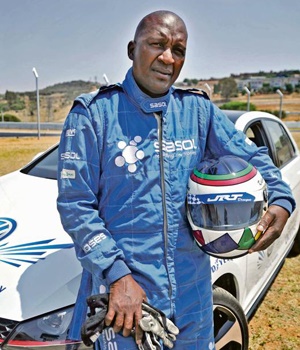
Johannesburg - He started his career as a hearse driver, but today, Phillip Kekana (50) is a Volkswagen advanced-driving training instructor years after becoming the first black South African to win a production-car championship. And, by the way, he was actor Idris Elba’s stunt driver.
We caught up with Kekana to find out more about his remarkable career. With more than 20 years’ experience in the motorsports industry, he’s driven everything from taxis to million-rand cars.
Tell us a little about yourself and when your love for motorsports started.
I was born and bred in Diepkloof, Soweto. I have always had a passion for speed. While growing up, I used to watch racing competitions, hoping to be behind the wheel one day. In the mid 1990s, I got a job working for my family’s funeral parlour as the hearse driver. One Saturday afternoon, while driving home from work, I stumbled upon the Kyalami racetrack in Midrand. I stopped next to the pavement and climbed on top of the car to watch the cars racing. I was so captivated by the roaring engines and sounds of the screeching tyres, I decided to sign up for an advanced-driving course.
Because my parents did not approve of this and refused to pay for the course, I took on an extra job over the weekends as a taxi driver to pay for my tuition fees – and that was the beginning of many opportunities.
Many people don’t know what advanced driving is and why it’s important to do the course. Please explain what it is and why it’s beneficial.
Well, it is said that the best drivers are the smoothest drivers, and smooth driving isn’t something you’ll master at a driving school. Driving along a straight road is easy; it’s taking sharp corners safely and making sure the car’s suspension is correct that is the challenge.
What people learn at an advanced-driving course are the things they don’t teach people at a driving school. For instance, if you take someone who received his licence yesterday and put him behind the wheel of a Golf GTI on the street, he’ll drive 200km/h easily, but he won’t have control of the car.
What advanced driving teaches you is “anticipation” – how to read things that are happening around you, which, in turn, will lead you to become a defensive driver, another very important quality in a good driver.
One of the most dangerous things drivers do is to only look at the road ahead. If you can’t see further than the bonnet of the car, then you’re not going to know what’s going on behind you or next to you. It’s important to be able to use all of the car’s controls smoothly and efficiently. Driving schools teach you the basics – we go beyond those.
You used to be a professional racer and now work as an advanced-driving instructor. How are the two connected?
The two aren’t very far apart – anyone can race, but understanding the car and knowing how to control it is what is important. When I started racing, I was fortunate to have people around me who knew and understood what advanced driving was. They didn’t just teach me how to do the quickest lap in the fastest time; they taught me control and timing – being one with your car. A driver who can do 200km/h and still control the suspension of his vehicle is not a good driver; he is an advanced driver.
What do you need to become an advanced driving instructor or a motorsports racer?
To be an instructor, you need to be 18 or older and hold a legal driver’s licence for at least two years before you start training. You must be able to pass a criminal record check and have or be able to obtain a tax-clearance certificate to apply for the advanced-training course. From there, you will be trained and tested in driving and, if you make it past the tests with excellent results from the instructor, you will be rewarded with a certificate.
To be a motorsports driver, you need to have a passion for cars and, most importantly, need to go through the advanced-driving courses that will help you control the car. You need to make sure that you have a healthy diet and exercise regularly because the speed and motion of the car can do a lot of damage to your body. After a race, you need three days of rest to fully recover.
What are your greatest achievements in the motorsports industry?
In 1994, I was granted a trial at Speed International at the Midvaal raceway in Gauteng. It is a sponsored event aimed at selecting potential racecar drivers. I was still very fresh and inexperienced and I didn’t know anything. To my surprise, I made it and managed to secure a sponsor. Within a few weeks, I was in the starting lane for my first professional race at Kyalami.
I started accumulating experience and started making my mark during the 1990s. I started consistently coming first or second in domestic races. I think it’s because a lot of people were saying I couldn’t do it, that I was out of my depth in a white man’s sport or that I was going to kill myself – which did discourage me – but I told myself I was going to do it.
In 2002, I was the first black person to win the SA Production Car Championship. I couldn’t believe it; it was a dream come true.
One of my other biggest achievements and a highlight of my career was in film. In the movie Mandela: Long Walk to Freedom, there is a scene where Nelson Mandela [played by British actor Idris Elba] is being chased by the police. Many people believed it was Idris driving, but in reality it was me driving as the stunt driver.
What do you enjoy about your career?
I get to work with different people every day. I meet people who think driving is just going from point A to point B and don’t actually know that there is so much more to it. I change people’s perspectives when it comes to driving, and they start to view it differently. They also go on to incorporate some of the skills they learnt in their everyday lives.
What advice can you give people who want to become advanced-driving training instructors or motorsports racers
They must have a passion for cars and must want to understand everything about a car. They must be willing to learn and take criticism. There are a lot of obstacles that need to be overcome.
There are many career options for young South Africans – such as racing – that need to be explored. People just need to open their eyes wide enough to see these opportunities.




 Publications
Publications
 Partners
Partners











